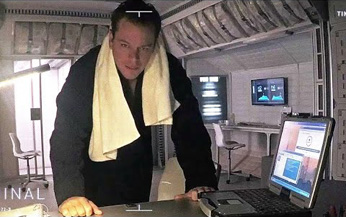2016 Calvin Awards: Best Use of Music
By Kim Hollis
February 23, 2016
BoxOfficeProphets.com

This year, our Calvin Award goes to a movie that won by a single point. This year, it was truly a case where every vote mattered! And thanks to one astronaut’s penchant for disco music (and another one’s abhorrence of it), The Martian is that victor. When Mark Watney, stranded alone on Mars, raids the music and video of his crewmates for entertainment, he discovers that his mission commander left behind nothing but disco. Thus, his “soundtrack” for his stay on the red planet is comprised of stuff like “Turn the Beat Around,” “Hot Stuff,” “Rock the Boat,” “Waterloo” and “I Will Survive.” And of course, we also have the nearly perfect usage of the late David Bowie’s “Starman.” The music encapsulates the humor in a story that is in reality fraught with peril.
With the top spot decided, that leaves The Hateful Eight to just barely miss out on the win. Quentin Tarantino is known for his use of music in film - Pulp Fiction’s soundtrack is legendary; Kill Bill Vol. 1 is a previous winner in this category. The Hateful Eight was a first for the director, though. Rather than using popular music as the “soundtrack” of the film, he commissioned a complete score. The creator of this atmospheric music was the legendary Ennio Morricone, who has composed more than 500 scores for film and television, including all of Sergio Leone’s movies and The Untouchables. Using influence from Italian giallo films, he crafted the perfect accompaniment to a film about unsavory characters who work for and against each other in a sort of pseudo mystery.
Quick, name the top international grossing movie of 2015. Nope, it’s not Star Wars (although it may eventually gain that spot). It’s not Jurassic World, either. Instead, the movie that made the most money internationally in 2015 - and the third highest amount all-time - is Furious 7. Its success in these overseas venues can be attributed to the fact that it has appeal to a wide-ranging demographic, and its musical soundtrack is reflective of that multi-cultural flavor. The tunes range from hip-hop, electronic dance music and Latin pop - and then somehow manages some songs that fuse those genres together. The film’s capstone is “See You Again,” which was written by Wiz Khalifa and Charlie Puth in honor of the late Paul Walker. It charted at #1 in 14 different countries, including the United States.
Fourth and fifth go to films set in the future - but what different futures they imagine. Mad Max: Fury Road’s post-nuclear atmosphere is complemented by the score from Junkie ML. He claims to have been inspired by the work of Bernard Herrmann, who is known for his work with Hitchcock on Psycho, North by Northwest and Vertigo. Along with that, he channels rock opera, which is obvious when you first see flamethrower guitar guy appear on the scene. It relies heavily on drums to drive the action of the film and set the tension.
For Ex Machina, our fifth place film, the soundtrack illustrates the evolution of Ava. From the fantastical and innocent introductory music to the eventual more sinister tones, the music helps us to understand the artificial intelligence character played by Alicia Vikander just a little bit more. Oh, and we’re pretty sure that the dance scene featuring Oliver Cheatham’s “Get Down Saturday Night” earned it some votes, too.
The films in sixth and seventh place feature music from composers who are lesser known in the industry. In fact, the score for It Follows is from a musician who is entirely new to movie scoring. Disasterpeace, aka Richard Vreeland, pays homage to classic horror films of the ‘70s and ‘80s in the anachronistic film (is it set in the ‘80s? The present? The future?), including John Carpenter’s Halloween. His score sets an oppressive, creepy mood that suits the movie’s plot.
Mission: Impossible - Rogue Nation’s composer Joe Kraemer has a bit more experience in the industry, but he’s still an up and comer. His score for M:I5 is clever in its incorporation of Lalo Schifrin’s themes from the original television series as well as the “Nessun dorma” aria from the Puccini opera Turandot.
Speaking of incorporating old musical themes, John Williams borrows from himself for Star Wars: The Force Awakens, while also creating new and lasting songs for characters like Rey and Finn that will carry through the remainder of the series. Williams has always been able to tell stories through his music, and this latest version of Star Wars is yet another example of how he finds such success in the arena.
Our final two movies have… almost nothing in common, really. Straight Outta Compton almost seems like an obvious choice in retrospect. It uses songs from NWA to illustrate the various stage’s of the band’s career. Other featured artists in the film’s music include Ice Cube, Eazy-E, Dr. Dre and Snoop Dogg.
The Big Short has a well-crafted score from Nicholas Bretell that combines with soundtrack selections that help to tell the story. In particular, the movie features a lot of metal thanks to Michael Burry’s obsession with drums. Bands such as Mastodon, Metallica, Darkest Hour and Pantera all emerge from his playlist. Other perfectly timed songs include Gnarls Barkley’s “Crazy,” “Feel Good Inc.” by Gorillaz, and Led Zeppelin’s “When the Levee Breaks.”
Kingsman: The Secret Service, Creed, The Revenant, Love & Mercy and Dope are all movies that just barely missed making our cut.
Calvins Intro
Best Actor
Best Actress
Best Album
Best Cast
Best Character
Best Director
Best Overlooked Film
Best Picture
Best Scene
Best Screenplay
Best Supporting Actor
Best Supporting Actress
Best TV Show
Best Use of Music
Breakthrough Performance
Worst Performance
Worst Picture